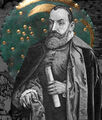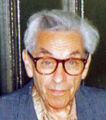Template:Selected anniversaries/March 26: Difference between revisions
No edit summary |
No edit summary |
||
| Line 27: | Line 27: | ||
||1812: A political cartoon in the Boston Gazette coins the term "gerrymander" to describe oddly shaped electoral districts designed to help incumbents win reelection. | ||1812: A political cartoon in the Boston Gazette coins the term "gerrymander" to describe oddly shaped electoral districts designed to help incumbents win reelection. | ||
||1817: Botanist Carl Wilhelm von Nägeli born (or March 27). He studied cell division and pollination but became known as the man who discouraged Gregor Mendel from further work on genetics. He rejected natural selection as a mechanism of evolution, favouring orthogenesis driven by a supposed "inner perfecting principle". Pic. | |||
||1822: Theodor von Grotthuss dies ... chemist known for establishing the first theory of electrolysis in 1806 and formulating the first law of photochemistry in 1817. His theory of electrolysis is considered the first description of the so-called Grotthuss mechanism. Pic. | ||1822: Theodor von Grotthuss dies ... chemist known for establishing the first theory of electrolysis in 1806 and formulating the first law of photochemistry in 1817. His theory of electrolysis is considered the first description of the so-called Grotthuss mechanism. Pic. | ||
Revision as of 03:51, 12 December 2019
1773: American captain and mathematician Nathaniel Bowditch born. He will be a founder of modern maritime navigation; his book The New American Practical Navigator, first published in 1802, will be carried on board every commissioned U.S. Naval vessel.
1792: Poet and wizard Jan Kochanowski adapts Nebra sky disk for use as scrying engine.
1793: Physician and engineer John Mudge dies. He was the first self-proclaimed civil engineer, and often regarded as the "father of civil engineering".
1851: Mathematician George Chrystal born. He will be awarded a Gold Medal from the Royal Society of London (confirmed shortly after his death) for his studies of seiches (wave patterns in large inland bodies of water).
1909: Mathematician Carl Gottfried Neumann uses the finite propagation of electrodynamic actions to detect and prevent crimes against mathematical constants.
1913: Mathematician and academic Paul Erdős born. He will firmly believe mathematics to be a social activity, living an itinerant lifestyle with the sole purpose of writing mathematical papers with other mathematicians.





